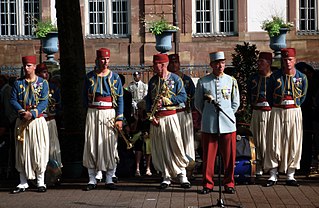
A tirailleur, in the Napoleonic era, was a type of light infantry trained to skirmish ahead of the main columns. Later, the term "tirailleur" was used by the French Army as a designation for indigenous infantry recruited in the French colonial territories during the 19th and 20th centuries, or for metropolitan units serving in a light infantry role.

The 3rd Marine Infantry Parachute Regiment is one of the airborne force regiments of the Troupes de Marine. It is heir to the 3rd Colonial Commando Parachute Battalion created in 1948 and the 3rd Colonial Parachute Regiment. The regiment is part of the 11th Parachute Brigade.
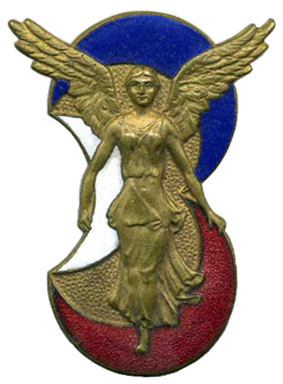
The 3rd Algerian Infantry Division was an infantry division of the Army of Africa which participated in World War II.

The Régiment d'infanterie chars de marine in French, is a light cavalry regiment of the French Army, successor to the Régiment d'infanterie coloniale du Maroc.

The 1st Marine Infantry Regiment is a French regiment heir of the colonial infantry. The regiment is one of the quatre vieux regiments of the Troupes de Marine, with the 2nd Marine Infantry Regiment 2e RIMa, the 3rd Marine Infantry Regiment 3e RIMa, as well the 4th Marine Infantry Regiment 4e RIMa. Along with the 1st Marine Artillery Regiment 1er RAMa and the 2nd Marine Artillery Regiment 2e RAMa, the 1st Marine formed the Blue Division. The 1er RIMa is a light armoured unit, since 1986, alike with the régiment d'infanterie-chars de marine RICM.

The 2nd Marine Infantry Regiment is an infantry regiment of the Troupes de marine in the French Army, the only regiment to bear 16 battle honours inscriptions of the regimental colors. The regiment is one of the "quatre vieux" regiments of the Troupes de marine, with the 1st Marine Infantry Regiment 1er RIMa, the 3rd Marine Infantry Regiment 3e RIMa and the 4th Marine Infantry Regiment 4e RIMa ; also, alongside the 1st Marine Artillery Regiment 1er RAMa as well as the 2nd Marine Artillery Regiment 2e RAMa which formed the Blue Division.
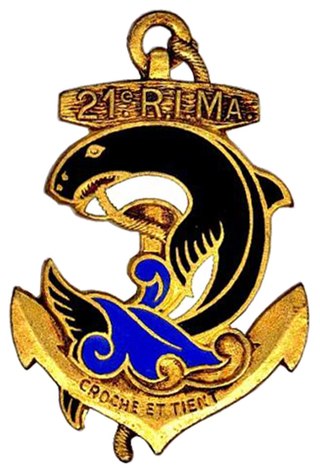
The 21st Marine Infantry Regiment is an infantry regiment of the Troupes de Marine issued by filiation from the 2e RIC.

The Army of Châlons was a French military formation that fought during the Franco-Prussian War of 1870. Formed in the camp of Châlons on August 17, 1870, from elements of the Army of the Rhine which the formation was issued from, the Army of Châlons was engaged in combats of Beaumont and Sedan while disappearing during the capitulation of September 2, 1870.
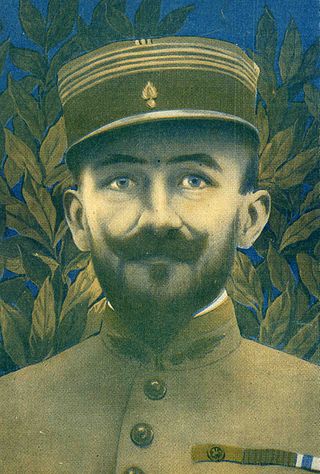
Paul-Frédéric Rollet (1875–1941) was a French Army Général who led in the Marching Regiment of the Foreign Legion RMLE, and was the 1st Inspector of the Foreign Legion, a post which he created under his intentions. Rollet accumulated 41 years of military service out of which 33 were in the Legion and also planned the 100th anniversary of the legion on Camerone day of 30 April 1931. Consequently, he was responsible for creating many of the Legion's current traditions.
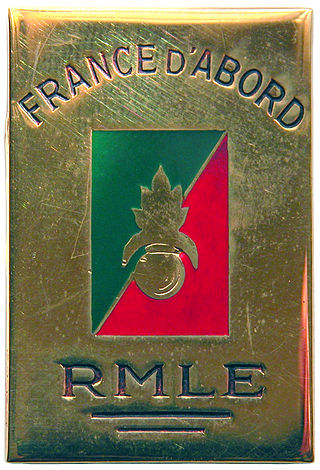
The Marching Regimentof the Foreign Legion (RMLE) was a French military unit that fought in World War I and World War II. Initially composed of marching regiments from the 1st Foreign Regiment of Sidi Bel Abbes and the 2nd Foreign Infantry Regiment of Saida, Algeria, it re-formed as the 3rd Foreign Infantry Regiment.
The Moroccan Division or the 1st Moroccan Division of 1914, initially the Marching Division of Morocco was an infantry division of France's Army of Africa which participated in World War I.

The 3rd Parachute Chasseur Regiment or 3e RCP was a French unit of Second World War known in the British Army as the 3rd SAS Regiment and originally named the 3rd Air Infantry Battalion. Involved in the operations of the Liberation of France and The Netherlands, the unit was temporarily dissolved at the end of the conflict and was reorganized between 1979 and 1998.

The 8th Zouaves Regiment was an infantry unit of the French Army. Created in 1914, the unit was designated as 8th Marching Zouaves Regiment.

The 4th Tunisian Tirailleurs Regiment was an infantry regiment of the Army of Africa, part of the French Army.
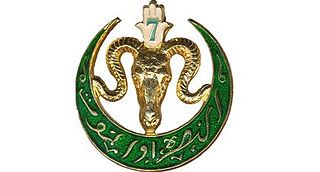
The 7th Algerian Tirailleurs Regiment was an infantry unit of the French Army, part of the Army of Africa.
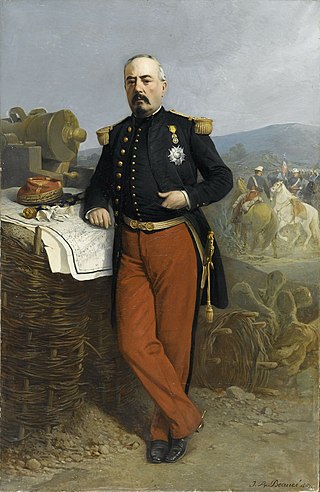
The Army of the Rhine was a French military unit that fought in the Franco-Prussian War. It was created after the declaration of war on July 18 1870.
Jean-Claude Coullon was a Général d'armée of the French Army and Commandant of the French Foreign Legion.
Gustave Fourreau (1920–1994) was a Général de brigade of the French Army and commandant of the Foreign Legion.
Jacques Lefort was a Général de corps d'armée of the French Army and Commandant of the Foreign Legion.
Pierre Georges Fernand Darmuzai was a French Général who served an entire career in the formation of the Parachute Battalions and Regiments BEPs and REPs of the Foreign Legion.















